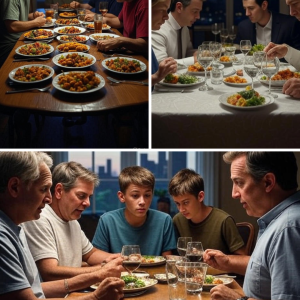Family dynamics often walk a thin line between affection and rivalry. Support can blur into control, and generosity can disguise condescension. The story of Rachel, a young woman in her mid-20s, illustrates how toxic patterns in families can erode dignity—and how reclaiming one’s narrative requires not just strength, but creativity.
From the beginning, Rachel worked hard to build her independence. She managed her finances, lived within her means, and took pride in not depending on anyone else. Yet her cousin Laura and aunt Diane gradually chipped away at that pride by disguising mockery as “generosity.” Laura’s habit of delivering bags of worn-out, stained, and unusable clothes was framed as kindness, but in reality, it was little more than a way to offload junk.
Diane reinforced this imbalance, turning any refusal into proof of Rachel’s supposed ingratitude. What might have seemed like a small annoyance at first grew into a form of public humiliation, culminating in Rachel being branded “Ungrateful Rachel” at a family barbecue. The nickname stuck, spreading through the family as if her worth could be reduced to a punchline.
What made this particularly painful was not only the ridicule but the silence of others. Even Rachel’s own mother urged her to accept the clothes rather than stir conflict, leaving her feeling isolated. In this environment, Laura polished her image as the “generous cousin,” while Diane played the role of the sharp-tongued matriarch. The truth—that Rachel was financially independent and didn’t need anyone’s cast-offs—was buried beneath appearances and manipulation.
The turning point came when Rachel realized that silence would only cement the role they had written for her. Instead of retaliating with anger, she chose a strategy rooted in exposure and transformation. When Laura delivered another bag of deteriorating clothes, Rachel repurposed it for a workplace clothing drive. By placing the items alongside genuine donations from colleagues, she revealed their true nature—not through argument, but through contrast. What Laura and Diane had called “gifts” were exposed for what they really were: discarded, unworthy items presented as charity.
The results spoke volumes. Co-workers recognized the insult immediately and responded not with ridicule but with solidarity, bringing in clean, stylish clothing that far outshone Laura’s offerings. Within days, Rachel’s initiative blossomed into a successful drive that supported a local shelter. What had begun as an attempt to demean her instead became a platform for generosity on her own terms. Rachel not only reclaimed her dignity but also created something meaningful, turning humiliation into empowerment.
This story underscores several key lessons. First, so-called “help” is not always genuine; sometimes it is a tool to reinforce superiority and dependency. Second, silence in the face of ridicule can allow harmful narratives to flourish unchecked. Finally, true strength lies not in fighting fire with fire, but in redirecting harmful energy into something constructive. Rachel’s response transformed mockery into community service, flipping the script entirely and exposing the hollowness of her aunt and cousin’s “generosity.”
In the end, Rachel’s story is about more than family conflict—it is about redefining identity when others try to impose their own version of it. By refusing to play the role of the “ungrateful” cousin, she asserted her independence and dignity in a way that could not be denied. Her resilience shows that empowerment often comes not from confrontation alone, but from creativity, courage, and the refusal to let others write the ending of your story.





